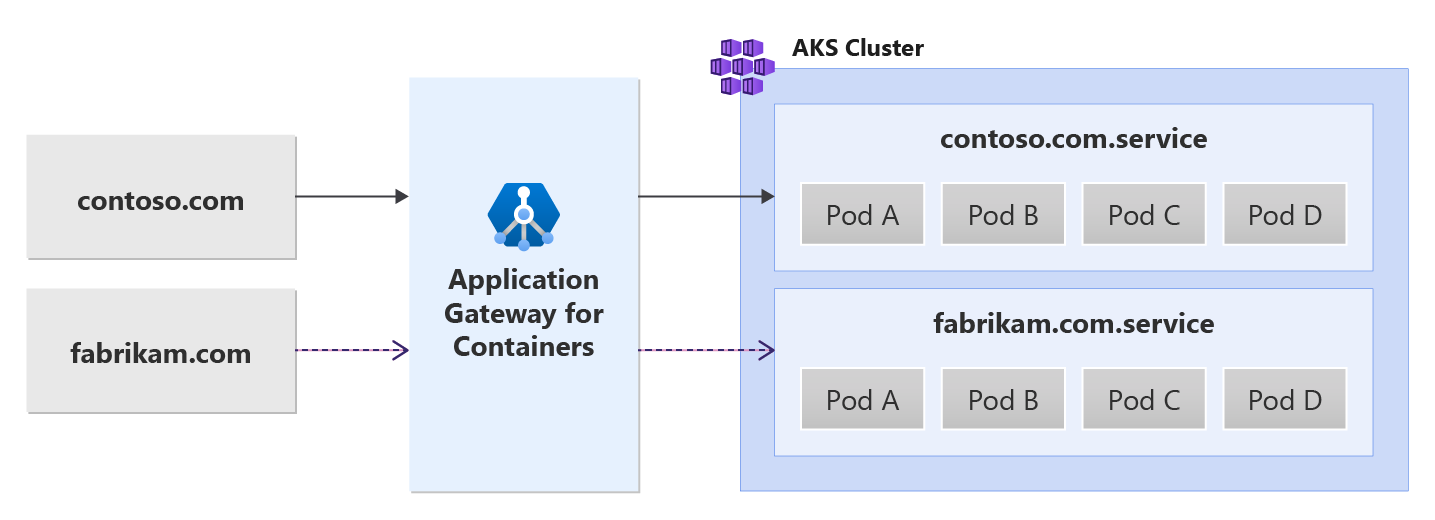Application Gateway for Containers を使用したマルチサイトのホスティング - Gateway API
このドキュメントでは、Gateway API からリソースを使用するサンプル アプリケーションを設定して、同じ Kubernetes Gateway リソース/Application Gateway for Containers フロントエンドで複数のサイトをホストするデモンストレーションを行います。 手順については、以下で説明します。
背景
Application Gateway for Containers を使用することで、同じポートで複数の Web アプリケーションを構成できることにより、複数サイトをホストできるようになります。 一意のバックエンド サービスを使用して、2 つ以上の一意のサイトをホストできます。 次のシナリオ例を参照してください。

前提条件
BYO デプロイ戦略を使用した場合は、Application Gateway for Containers リソースと ALB コントローラーを設定していることを確認します。
ALB マネージド デプロイ戦略を使用した場合は、ApplicationLoadBalancer カスタム リソースを使用して、ALB コントローラーと Application Gateway for Containers リソースをプロビジョニングしていることを確認します。
サンプル HTTP アプリケーションをデプロイする:
クラスターに次の deployment.yaml ファイルを適用し、パス、クエリ、ヘッダー ベースのルーティングのデモンストレーションを行うサンプル Web アプリケーションを作成します。kubectl apply -f https://raw.githubusercontent.com/MicrosoftDocs/azure-docs/refs/heads/main/articles/application-gateway/for-containers/examples/traffic-split-scenario/deployment.yamlこのコマンドによって、クラスターに次のものが作成されます。
test-infraと呼ばれる名前空間test-infra名前空間のbackend-v1およびbackend-v2と呼ばれる 2 つのサービスtest-infra名前空間のbackend-v1およびbackend-v2と呼ばれる 2 つのデプロイ
必要な Gateway API リソースをデプロイする
- ゲートウェイを作成する
kubectl apply -f - <<EOF
apiVersion: gateway.networking.k8s.io/v1
kind: Gateway
metadata:
name: gateway-01
namespace: test-infra
annotations:
alb.networking.azure.io/alb-namespace: alb-test-infra
alb.networking.azure.io/alb-name: alb-test
spec:
gatewayClassName: azure-alb-external
listeners:
- name: http-listener
port: 80
protocol: HTTP
allowedRoutes:
namespaces:
from: Same
EOF
Note
ALB コントローラーは、ARM で Application Gateway for Containers リソースを作成するときに、フロントエンド リソースに対して次の名前付け規則を使用します。fe-<ランダムに生成された 8 文字>
Azure で作成されたフロントエンドの名前を変更したい場合は、BYO デプロイ戦略に従うことを検討してください。
ゲートウェイ リソースが作成されたら、状態が有効であること、リスナーが [プログラム済み] であること、ゲートウェイにアドレスが割り当てられていることを確認します。
kubectl get gateway gateway-01 -n test-infra -o yaml
ゲートウェイの作成に成功した出力例。
status:
addresses:
- type: Hostname
value: xxxx.yyyy.alb.azure.com
conditions:
- lastTransitionTime: "2023-06-19T21:04:55Z"
message: Valid Gateway
observedGeneration: 1
reason: Accepted
status: "True"
type: Accepted
- lastTransitionTime: "2023-06-19T21:04:55Z"
message: Application Gateway For Containers resource has been successfully updated.
observedGeneration: 1
reason: Programmed
status: "True"
type: Programmed
listeners:
- attachedRoutes: 0
conditions:
- lastTransitionTime: "2023-06-19T21:04:55Z"
message: ""
observedGeneration: 1
reason: ResolvedRefs
status: "True"
type: ResolvedRefs
- lastTransitionTime: "2023-06-19T21:04:55Z"
message: Listener is accepted
observedGeneration: 1
reason: Accepted
status: "True"
type: Accepted
- lastTransitionTime: "2023-06-19T21:04:55Z"
message: Application Gateway For Containers resource has been successfully updated.
observedGeneration: 1
reason: Programmed
status: "True"
type: Programmed
name: https-listener
supportedKinds:
- group: gateway.networking.k8s.io
kind: HTTPRoute
ゲートウェイが作成されたら、contoso.com および fabrikam.com ドメイン名に対して 2 つの HTTPRoute リソースを作成します。 各ドメインは、異なるバックエンド サービスにトラフィックを転送します。
kubectl apply -f - <<EOF
apiVersion: gateway.networking.k8s.io/v1
kind: HTTPRoute
metadata:
name: contoso-route
namespace: test-infra
spec:
parentRefs:
- name: gateway-01
hostnames:
- "contoso.com"
rules:
- backendRefs:
- name: backend-v1
port: 8080
---
apiVersion: gateway.networking.k8s.io/v1
kind: HTTPRoute
metadata:
name: fabrikam-route
namespace: test-infra
spec:
parentRefs:
- name: gateway-01
hostnames:
- "fabrikam.com"
rules:
- backendRefs:
- name: backend-v2
port: 8080
EOF
HTTPRoute リソースが作成されたら、両方の HTTPRoute リソースに "承認済み" と表示され、Application Gateway for Containers リソースが "プログラム済み" になっていることを確認します。
kubectl get httproute contoso-route -n test-infra -o yaml
kubectl get httproute fabrikam-route -n test-infra -o yaml
各 HTTPRoute について、Application Gateway for Containers リソースの状態が正常に更新されていることを確認します。
status:
parents:
- conditions:
- lastTransitionTime: "2023-06-19T22:18:23Z"
message: ""
observedGeneration: 1
reason: ResolvedRefs
status: "True"
type: ResolvedRefs
- lastTransitionTime: "2023-06-19T22:18:23Z"
message: Route is Accepted
observedGeneration: 1
reason: Accepted
status: "True"
type: Accepted
- lastTransitionTime: "2023-06-19T22:18:23Z"
message: Application Gateway For Containers resource has been successfully updated.
observedGeneration: 1
reason: Programmed
status: "True"
type: Programmed
controllerName: alb.networking.azure.io/alb-controller
parentRef:
group: gateway.networking.k8s.io
kind: Gateway
name: gateway-01
namespace: test-infra
アプリケーションへのアクセスをテストする
これで、フロントエンドに割り当てられた FQDN を使用して、サンプル アプリケーションにトラフィックを送信する準備ができました。 次のコマンドを実行して、FQDN を取得します。
fqdn=$(kubectl get gateway gateway-01 -n test-infra -o jsonpath='{.status.addresses[0].value}')
curl コマンドを使用してサーバー名インジケーターを指定し、フロントエンド FQDN として contoso.com を指定すると、バックエンド v1 サービスからの応答が返されます。
fqdnIp=$(dig +short $fqdn)
curl -k --resolve contoso.com:80:$fqdnIp http://contoso.com
応答を介して、次の内容が表示されます。
{
"path": "/",
"host": "contoso.com",
"method": "GET",
"proto": "HTTP/1.1",
"headers": {
"Accept": [
"*/*"
],
"User-Agent": [
"curl/7.81.0"
],
"X-Forwarded-For": [
"xxx.xxx.xxx.xxx"
],
"X-Forwarded-Proto": [
"http"
],
"X-Request-Id": [
"dcd4bcad-ea43-4fb6-948e-a906380dcd6d"
]
},
"namespace": "test-infra",
"ingress": "",
"service": "",
"pod": "backend-v1-5b8fd96959-f59mm"
}
curl コマンドを使用してサーバー名インジケーターを指定し、フロントエンド FQDN として fabrikam.com を指定すると、バックエンド v1 サービスからの応答が返されます。
fqdnIp=$(dig +short $fqdn)
curl -k --resolve fabrikam.com:80:$fqdnIp http://fabrikam.com
応答を介して、次の内容が表示されます。
{
"path": "/",
"host": "fabrikam.com",
"method": "GET",
"proto": "HTTP/1.1",
"headers": {
"Accept": [
"*/*"
],
"User-Agent": [
"curl/7.81.0"
],
"X-Forwarded-For": [
"xxx.xxx.xxx.xxx"
],
"X-Forwarded-Proto": [
"http"
],
"X-Request-Id": [
"adae8cc1-8030-4d95-9e05-237dd4e3941b"
]
},
"namespace": "test-infra",
"ingress": "",
"service": "",
"pod": "backend-v2-594bd59865-ppv9w"
}
これで、ALB コントローラーをインストールし、バックエンド アプリケーションをデプロイして、Application Gateway for Containers の Gateway API 経由で異なるホスト名を介して 2 つの異なるバックエンド サービスにトラフィックをルーティングすることができました。